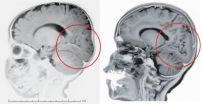(Press-News.org) Gene expression is the process of converting the genetic information encoded in DNA into a final gene product such as a protein or any of several types of RNA. Scientists have long thought that the gene programs regulated by different physiological processes throughout the body are robustly pre-determined and relatively fixed for every specialized cell. But a new study by researchers from the University of California, San Diego School of Medicine reveals the unsuspected plasticity of some of these gene expression programs.
Their findings, to be published in the May 15 advanced on-line edition of journal Nature, show the existence of distinct regulated gene programs that can be alternatively induced, depending on the intracellular conditions. The study helps explain why, for example, the same signaling event – such as cellular response to circulating hormones in the human body – can be beneficial for normal development, but also becomes cancerous when combined with other genetic lesions.
The UCSD scientists found that the response to the hormone androgen in prostatic epithelial cells can be subject to dramatic reprogramming events that lead to alternative gene programs and profiles. They suggest that this plasticity could be the basis for development and progression of at least some forms of cancer, as well as for cell differentiation during development.
From a patient perspective, the results of this study may explain how hormonal therapy, applied to prostate cancer patients to block the pre-established, hormone-regulated tumor growth, escapes this treatment in a more malignant way.
"Aggressive cell types, such as those found in prostate cancer, basically learn to ignore the hormone therapy," said co-principal investigator Xiang-Dong Fu, PhD, professor in the UCSD Department of Cellular and Molecular Medicine, who collaborated with co-principal investigator Michael G. Rosenfeld, MD, professor in the UCSD Department of Medicine and a Howard Hughes Medical Institute investigator.
In this study, the UCSD researchers looked at the down-regulation in expression of a single transcription factor, FoxA1, an unfavorable sign in certain advanced prostate tumors. They present evidence that FoxA1, which is needed for normal prostatic development, can simultaneously facilitate and restrict the genomic binding of the receptor that controls the hormonal response. Consequently, down-regulation of FoxA1 triggers reprogramming of the hormonal response.
Interestingly, other cancer-associated events, such as specific AR genetic mutations, appear capable of inducing a similar effect. The subsequent massive switch in AR binding to a distinct cohort of pre-established regulatory elements in the human genome (called enhancers) is what may allow the cancer cells to "reprogram" themselves.
These findings suggest that therapies designed to stop the switch between different alternative gene programs may be more effective than simply blocking the hormonal response, according to co-first author Dong Wang, PhD and co-first author and co-principal investigator Ivan Garcia-Bassets, PhD, research assistant professor in the UCSD Division of Endocrinology and Metabolism, Department of Medicine.
###
Additional contributors to the study include co-first author Chris Benner, PhD, Jinsong Qiu, PhD, Minna U. Kaikkonen, PhD, and Christopher K. Glass, MD, PhD, UCSD Department of Cellular and Molecular Medicine; Wenbo Li, PhD, Kenneth A. Ohgi, UCSD Department of Medicine, Howard Hughes Medical Institute; Xue Su and Wen Liu, Howard Hughes Medical Institute and UCSD graduate program in biology; and Yiming Zhou, PhD, Dignomics LLC, Malden, MA.
This comprehensive study of the mechanism underlying gene expression reprogramming was supported by funding from the Department of Defense, the National Institutes of Health, the National Cancer Institute, the Prostate Cancer Foundation and the Howard Hughes Medical Institute.
Plasticity of hormonal response permits rapid gene expression reprogramming
Gene expression reprogramming may allow cancer cell growth as well as normal differentiation
2011-05-16
ELSE PRESS RELEASES FROM THIS DATE:
LA Story from Posh Bingo
2011-05-16
Posh Bingo players have the chance to win a trip to Los Angleles. Talk about California Dreaming! The game which only costs GBP1 to play is happening at 9.45pm on Sunday 3 July. Then players have the chance to play for GBP2,500 holiday vouchers as well as GBP500 spending cash. That is GBP3,000 prize that almost seems too good to be true but at Posh Bingo a lot seems like that.
Pre-buy your GBP1 cards for the GBP3k L.A. game now! Or EARN cards into the game for every 500 L.A. points you accumulate!
You can also win cards to the games thanks to the accumulation of 500 ...
Scientists find new class of compounds with great potential for research and drug development
2011-05-16
Scientists from The Scripps Research Institute have identified a class of compounds that could be a boon to basic research and drug discovery.
In a new study, published online in Nature Chemical Biology on May 15, 2011, the researchers show the new compounds powerfully and selectively block the activity of a large and diverse group of enzymes known as "serine hydrolases." Previously discovered serine hydrolase-blocking compounds have been turned into drugs to treat obesity, diabetes, and Alzheimer's disease, and are currently in testing as treatments for pain, anxiety, ...
Next generation gamers: Computer games aid recovery from stroke
2011-05-16
Computer games are not just for kids. New research published in Journal of NeuroEngineering and Rehabilitation, a BioMed Central open access journal, shows that computer games can speed up and improve a patient's recovery from paralysis after a stroke.
It is often difficult for stroke victims to recover hand and arm movement, and 80-90% of sufferers still have problems six months later. Scientists in America looked at a group of people who had impaired use of one arm after a stroke and found that computer simulations and cutting edge techniques, used by the film industry ...
Fly Away Thanks to Wink Bingo
2011-05-16
Wink Bingo has a number of fantastic promotions running. The newest allows players the opportunity to get away. Wink Bingo is giving its players the chance to fly away thanks to the GBP6k Fly Away game. In this game there are two chances to win the GBP2500 holiday vouchers and GBP500 spending money. You can play either in the Arrivals or the Departures Room. In the Arrivals room, players can't buy cards but can only earn free cards.
Every 500 points is good for one card and points can be earned in a variety of ways. Bingo on the Sunlounger pattern and that is good for ...
Exotic behavior when mechanical devices reach the nanoscale
2011-05-16
Most mechanical resonators damp (slow down) in a well-understood linear manner, but ground-breaking work by Prof. Adrian Bachtold and his research group at the Catalan Institute of Nanotechnology has shown that resonators formed from nanoscale graphene and carbon nanotubes exhibit nonlinear damping, opening up exciting possibilities for super-sensitive detectors of force or mass.
In an article to be published in Nature Nanotechnology (DOI - 10.1038/NNANO.2011.71), Prof. Bachtold and his co-researchers describe how they formed nano-scale resonators by suspending tiny graphene ...
Advanced-stage prostate cancer patients experience 20-year survival rates with surgery
2011-05-16
WASHINGTON — Long-term survival rates for patients with advanced prostate cancer suggest they can be good candidates for surgery, Mayo Clinic researchers have found. Their study found a 20-year survival rate for 80 percent of patients diagnosed with cancer that has potentially spread beyond the prostate, known as cT3 prostate cancer, and treated with radical prostatectomy, or surgery to remove the prostate gland. Previously, patients found to have cT3 prostate cancer were offered radiation or hormone treatment, but not radical prostatectomy.
The researchers presented ...
Tiny variation in 1 gene may have led to crucial changes in human brain
2011-05-16
The human brain has yet to explain the origin of one its defining features – the deep fissures and convolutions that increase its surface area and allow for rational and abstract thoughts.
An international collaboration of scientists from the Yale School of Medicine and Turkey may have discovered humanity's beneficiary – a tiny variation within a single gene that determines the formation of brain convolutions – they report online May 15 in the journal Nature Genetics.
A genetic analysis of a Turkish patient whose brain lacks the characteristic convolutions in part ...
$5000 Cash to be Won in Freerolls from PokerStars and RakeTheRake.com
2011-05-16
This week RakeTheRake.com offers online poker players another great promotion in celebration of its new site launch. There's $5000 cash to be won in two freerolls being hosted by PokerStars and RakeTheRake. This PokerStars promotion is one of many unique prizes being offered over the three months until the end of July 2011, in addition to the normal $500k+ of monthly promotions.
For a chance to win a share of the prize money from these freerolls, players will need to 'like' RakeTheRake on facebook or follow RakeTheRakecom on twitter and watch for the promotion posts. ...
Researchers identify DNA region linked to depression
2011-05-16
AUDIO:
Researchers have identified a DNA region on chromosome 3 that appears to be related to depression. the discovery was made independently by groups at Washington University School of Medicine in...
Click here for more information.
Researchers at Washington University School of Medicine in St. Louis and King's College London have independently identified DNA on chromosome 3 that appears to be related to depression.
Major depression affects approximately 20 percent of ...
North Carolina Criminal Sentence Reduced After Kilo of Cocaine Found in Suspect's Car
2011-05-16
A North Carolina man received a greatly reduced sentence as a result of the strong defense work of criminal attorney Patrick Roberts at the Roberts Law Group PLLC. After officers discovered a kilogram of cocaine in the man's car during a traffic stop, the man was facing up to 175 to 219 months in prison or about 18 years. Instead, he was sentenced to only 35 to 42 months.
While the Roberts Law Group PLLC client is serving about three years in prison, his co-defendants - the other man in the same car and the alleged leader of the conspiracy - are serving about seven years ...
LAST 30 PRESS RELEASES:
Fossil amber reveals the secret lives of Cretaceous ants
Predicting extreme rainfall through novel spatial modeling
The Lancet: First-ever in-utero stem cell therapy for fetal spina bifida repair is safe, study finds
Nanoplastics can interact with Salmonella to affect food safety, study shows
Eric Moore, M.D., elected to Mayo Clinic Board of Trustees
NYU named “research powerhouse” in new analysis
New polymer materials may offer breakthrough solution for hard-to-remove PFAS in water
Biochar can either curb or boost greenhouse gas emissions depending on soil conditions, new study finds
Nanobiochar emerges as a next generation solution for cleaner water, healthier soils, and resilient ecosystems
Study finds more parents saying ‘No’ to vitamin K, putting babies’ brains at risk
Scientists develop new gut health measure that tracks disease
Rice gene discovery could cut fertiliser use while protecting yields
Jumping ‘DNA parasites’ linked to early stages of tumour formation
Ultra-sensitive CAR T cells provide potential strategy to treat solid tumors
Early Neanderthal-Human interbreeding was strongly sex biased
North American bird declines are widespread and accelerating in agricultural hotspots
Researchers recommend strategies for improved genetic privacy legislation
How birds achieve sweet success
More sensitive cell therapy may be a HIT against solid cancers
Scientists map how aging reshapes cells across the entire mammalian body
Hotspots of accelerated bird decline linked to agricultural activity
How ancient attraction shaped the human genome
NJIT faculty named Senior Members of the National Academy of Inventors
App aids substance use recovery in vulnerable populations
College students nationwide received lifesaving education on sudden cardiac death
Oak Ridge National Laboratory launches the Next-Generation Data Centers Institute
Improved short-term sea level change predictions with better AI training
UAlbany researchers develop new laser technique to test mRNA-based therapeutics
New water-treatment system removes nitrogen, phosphorus from farm tile drainage
Major Canadian study finds strong link between cannabis, anxiety and depression
[Press-News.org] Plasticity of hormonal response permits rapid gene expression reprogrammingGene expression reprogramming may allow cancer cell growth as well as normal differentiation



